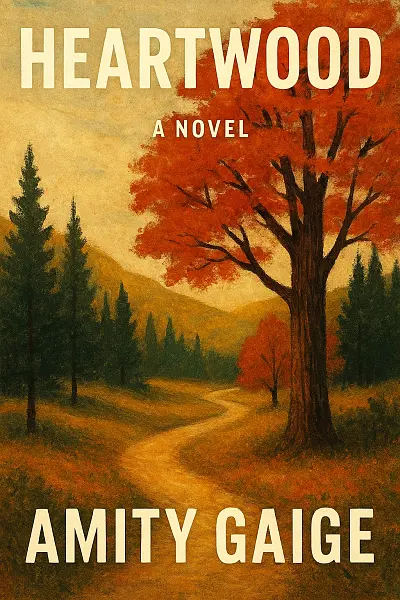
Heartwood
by: Amity Gaige
Valerie Gillis, a seasoned hiker, sets off alone into the wild beauty of Maine’s Appalachian Trail, determined to reach her goal. But when she mysteriously vanishes 200 miles from her destination, panic ripples through the close-knit outdoors community. The search heats up as Beverly, a no-nonsense Maine Game Warden, races against the clock, desperate to bring Valerie home alive—meanwhile, far away in Connecticut, spirited birdwatcher Lena throws herself into the puzzle from her retirement home.
Told with raw intimacy through Valerie’s haunting letters, Heartwood pulses with tension and isolation, always dangling the question: will hope—or the forest—win?
"“Roots grow deepest where forgiveness begins, and from that shelter, the heart learns how to heal.”"
Let's Break This Down
The Author's Voice
Atmosphere
Earthy, intimate, and quietly suspenseful, the mood in Heartwood wraps readers in a gentle, almost nostalgic contemplation. Gaige builds a world tinged with both melancholy and hope, playing with the hazy edges of family memory and the bittersweet ache of small-town life. Expect a setting that feels lived-in and tactile, with weathered porches, rustling trees, and the slow creak of passing time infusing every scene.
Prose Style
Gaige’s writing is luminous and thoughtful, striking a graceful balance between lyricism and clarity. Her sentences flow with an understated beauty—never flashy, but rich in resonance and subtle metaphor. Dialogue feels natural and unforced, lending the narrative a quiet authenticity. There’s restraint here: no word wasted, every description placed with care, infusing even everyday moments with a gentle poignancy.
Pacing
Measured and deliberate, the pace of Heartwood mirrors the rhythms of rural life—sometimes lingering, sometimes edging forward with an undercurrent of tension. Gaige favors slow reveals over bombastic turns, inviting readers to settle in and absorb the incremental shifts in relationships and understanding. It’s a book that rewards patience; plot developments bloom organically, allowing emotions and revelations to deepen over time.
Character Focus
Deeply introspective and psychologically attuned, Gaige crafts characters who feel achingly real. Internal conflict is rendered with nuance, and each character’s choices are grounded in a tangle of longing, regret, and hope. Readers can expect to spend much of the journey inside the characters’ heads, with motivation and memory as central engines of the narrative.
Overall Rhythm
If you love novels where mood and characterization are front and center, and you’re drawn to quiet domestic dramas rather than pulse-pounding action, Heartwood will feel like settling into a well-worn armchair—comforting, contemplative, and profoundly human.
Key Moments
- A father-in-law’s confession at the kitchen table—cracking open decades of family secrets
- Lyrical prose that evokes the tactile ache of New England landscapes
- "The good wood" metaphor threading through every generation—stubborn, resilient, flawed
- Mira’s quietly fierce confrontations with her immigrant past and uncertain future
- That Thanksgiving dinner where unspoken tensions nearly set the cranberry sauce on fire
- Witnessing marriage unravel not with shouts, but the gentle erosion of everyday silences
- Economic anxieties and class guilt—woven into every page like fine grain
Plot Summary
Heartwood by Amity Gaige follows the journey of Anna, a young woman grappling with the legacy of her late father and the unraveling of her marriage. After her father's death, Anna returns to her rural Connecticut hometown, seeking solace and answers. As she digs through her father's past, she discovers secrets about his infidelities and financial troubles, which parallel the cracks forming in her own relationship with her husband, Rick. The story builds to a climax as Anna must decide whether to forgive her father's mistakes and confront her dissatisfaction with her marriage. In the end, Anna finds a tentative peace, accepting both the flaws in her loved ones and the resilience in herself.
Character Analysis
Anna's character arc is marked by intense introspection and gradual acceptance. She's initially lost and frustrated, desperate for connection but internally conflicted by her father's moral ambiguity and her own wavering sense of right and wrong. Rick, her husband, is painted as steady but emotionally distant—his approach to their marital issues highlights Anna's longing for genuine intimacy. Anna's mother acts as a foil, quietly embodying resilience and generosity, ultimately showing Anna that forgiveness doesn't mean forgetting. Over the course of the novel, Anna grows more empathetic and mature, learning to balance her idealism with compassion.
Major Themes
The novel tackles forgiveness, both in family and marriage, as Anna grapples with her father's betrayals and her husband's flaws. Inheritance—not just material, but emotional and ethical—is central; Anna questions what legacies we absorb from parents and what we choose for ourselves. Gaige also delves into identity, especially the idea that understanding one's roots is vital to personal growth. The rural backdrop and the metaphor of "heartwood" (the strong, central part of a tree) reinforce the theme that people, like trees, are formed by layers of damage and healing.
Literary Techniques & Style
Amity Gaige is renowned for her lyrical, introspective prose, filled with evocative imagery and nature metaphors (notably, trees and wood). The structure weaves past and present, using flashbacks to reveal Anna's relationship with her father and the evolution of her marriage, which deepens our understanding gradually. Symbolism abounds—the family home, the woods, and the "heartwood" all represent shelter, memory, and resilience. Dialogue is crisp and realistic, providing insight into character motivations, while the narrative voice is intimate and confessional, drawing readers into Anna's emotional world.
Historical/Cultural Context
Heartwood is set in small-town Connecticut in the late 20th to early 21st century, capturing the worries and rhythms of middle-class New England life. The novel quietly reflects cultural shifts around marriage, gender expectations, and generational conflict. Anna’s struggle with her father’s secret life and her own marital dissatisfaction is very much a product of this transitional period in American family dynamics.
Critical Significance & Impact
Heartwood has been praised for its deft exploration of family dynamics and psychological depth—its emotional honesty stands out in contemporary fiction about domestic life. Though not a bestseller, it’s admired by critics and book clubs for the way it balances character and theme, and for Gaige’s elegant prose. The book remains relevant for anyone interested in stories of grief, inheritance, and finding self-acceptance through confronting painful truths.

Family secrets splinter a marriage in a New England of haunted memories.
What Readers Are Saying
Right for You If
Who’s Going to Love Heartwood by Amity Gaige?
If you’re the kind of reader who loves family dramas with a bit of emotional depth and nuance, this one’s totally up your alley. Think quiet novels where the drama comes more from what’s left unsaid than from anything flashy—Heartwood is all about those complicated relationships, life’s regrets, and the messiness of love and family.
-
Fans of character-driven stories: If you enjoy sinking into characters’ heads and really getting to know their flaws and hopes, you’ll feel right at home here. It’s not super plot-heavy, but if you care about how people think and feel, this book delivers.
-
Readers who vibe with literary fiction: This one is for those who appreciate lush writing, slow burns, and beautifully crafted sentences. If you love authors like Anne Tyler or Elizabeth Strout—the kind who shine a light on everyday moments—you’ll probably connect with Gaige’s style.
-
Fans of contemplative themes: If you’re interested in books that wrestle with big questions about forgiveness, identity, and what it means to belong, Heartwood is your kind of novel. It’s introspective and really sits with those feelings.
Who Might Want to Pass?
-
Plot junkies, beware: If you need twists, suspense, or stories that move at breakneck speed, you might find yourself getting impatient. This isn’t a page-turner so much as a slow, meandering walk through the woods—meaningful, but not exactly heart-pounding.
-
Those craving high-concept action: If you’re after thrillers, mysteries, or epic fantasy, I’d say skip this one. There’s no big external conflict, just the gentle (and sometimes uncomfortable) unraveling of family secrets.
In short: If you love stories that dig deep into family dynamics with beautiful writing and a thoughtful pace, Heartwood is a really rewarding read. If you’re looking for something more plot-driven or fast-paced, you might want to try something else.
What You're Getting Into
Looking for a captivating family drama with secrets and longing?
Heartwood by Amity Gaige drops us into rural Connecticut, where a widowed matriarch struggles to hold together her fractured family and the land they call home. When unexpected guests and past issues resurface, old wounds are tested, loyalties shift, and everyone must confront what truly ties them to each other and the place they belong.
Atmospheric, heartfelt, and tinged with nostalgia—this one’s for anyone drawn to stories of belonging, forgiveness, and family roots.
Characters You'll Meet
-
Penelope (Peg) Griswold: The central character, Peg is a witty, introspective widow fighting to hold onto her family’s land while uncovering secrets about her late husband. Her emotional journey is the novel’s beating heart, blending stubbornness with vulnerability.
-
Noel Griswold: Peg’s late husband, whose death and hidden past launch Peg’s quest for truth. His enigmatic presence shapes the family’s narrative and Peg’s own understanding of love and loyalty.
-
Jean Griswold: Peg’s daughter, a single mother balancing her own troubles with her strained relationship with Peg. Jean’s perspective challenges Peg’s certainties and sparks much of the family’s tension.
-
Hal March: The charismatic, eccentric tree surgeon hired by Peg, who becomes both a confidant and a catalyst for change. Hal’s earthy wisdom nudges Peg toward growth and renewal.
-
Eliot: Jean’s young son and Peg’s grandson, whose innocence and questions about family history gently prod the adults toward honesty and healing.
Isn’t it a pleasure when characters feel this real and flawed, each one adding new layers to the family drama?
More Like This
If Heartwood drew you in with its measured unraveling of family secrets and generational pain, you’ll likely recognize the bittersweet resonance of Anne Tyler’s A Spool of Blue Thread. Both novels masterfully explore the intricacies of family relationships, painting small moments with profound emotional depth. Readers who appreciate the complexity of character-driven storytelling, where the quietest exchanges brim with meaning, will absolutely find the same slow-burn satisfaction in Amity Gaige’s world.
There’s also a thread connecting Heartwood to Elizabeth Strout’s Olive Kitteridge. Like Strout, Gaige balances empathy and realism, examining flawed, relatable characters as they navigate love, disappointment, and the weight of the past. The nuanced portrait of personal longing and redemption in both books lingers long after the final page—ideal if you’re drawn to fiction that honestly reflects the messiness of real life.
On the screen, Heartwood brings to mind the evocative mood and emotional layering of the TV series Parenthood. Gaige’s ability to peel back the layers of ordinary lives and find the drama and beauty within echoes the show’s heartwarming mix of humor, struggle, and familial loyalty. If you’re the type to get swept up in stories that cherish the everyday, while exposing the fault lines beneath, you’ll find Heartwood fits snugly alongside your favorite family dramas.
Critic's Corner
What does it mean to vanish not just from sight, but from the narrative of one’s own life? Heartwood by Amity Gaige poses this urgent question, threading it through mist-wreathed forests and the tense, ticking clock of a desperate search. The novel’s fractured voices ask: what do we leave behind for those tasked to find us, and how do we rescue ourselves from the deep woods of memory, regret, and hope? It’s a haunting meditation on the literal and figurative lost.
Gaige’s writing is taut, yet uncannily lyrical—the perfect conduit for a wilderness both hostile and breathtaking. The narrative structure is daring, with shifting perspectives and timelines that keep the reader both guessing and emotionally attuned. Valerie’s letters to her estranged mother, elliptical and poetic, feel close to stream-of-consciousness without ever devolving into formlessness. In contrast, Beverly’s sections are terse, capturing the sweaty urgency of the search, while Lena’s retiree-detective voice brims with quirky, observational wit. Gaige is a master of tonal layering: her prose moves seamlessly between fear, longing, and dark humor. Short, unsparing sentences evoke the exhaustion of the rescue teams, while luminous nature descriptions ground the novel in place without getting bogged down in purple prose. The alternating points of view add complexity but sometimes disorient, and a few experimental devices (notably Valerie’s fragmented memories) skirt the line between profound and overwrought. Still, it’s a tremendously accomplished feat of voice.
Heartwood explores displacement, survival, and the porous border between isolation and connection. The central theme—the search for meaning in the midst of chaos—feels especially urgent in an era defined by environmental uncertainty and fractured relationships. Gaige probes the ethics of rescue, the agency of women in wild spaces, and the ways grief radiates outward, affecting strangers and loved ones alike. The Appalachian Trail becomes both setting and symbol—a corridor where boundaries of self, safety, and belonging dissolve. Valerie’s inner journey is at once intensely personal and universally resonant, mirroring larger social anxieties about disappearance and the limits of understanding. There’s an undercurrent of eco-criticism, a subtle meditation on the violence and beauty of nature, and the ways both can remake those who challenge them. The inclusion of Lena’s amateur sleuthing injects intergenerational tension, underscoring the loneliness and resourcefulness that can define both old age and the wilderness alike.
Within the realm of psychological survival thrillers, Heartwood distinguishes itself not through plot pyrotechnics, but interiority and atmosphere. Fans of Peter Heller or Tana French’s more rural works will find themselves at home, yet Gaige’s refusal to bend to genre formula is refreshing. Stylistically ambitious, it sits comfortably alongside Gaige’s previous novels in terms of emotional intelligence, but marks a bolder, riskier step for her as a storyteller. Compared to the avalanche of missing-person mysteries, it prioritizes how we are lost over merely if we are found.
Heartwood isn’t flawless—the occasional narrative convolution and emotional restraint in some sections may leave readers untethered. Yet its literary daring, rich sense of place, and pained empathy make it unforgettable. For those willing to hike into linguistic thickets and emotional fog, this novel is a rare, rewarding find.
Community Thoughts
I swear, I finished Heartwood and immediately checked the locks on my doors. That one late-night confession scene with Lottie? It crawled under my skin and camped out for days. I still hear her voice echoing when the house settles.
So there’s this scene with Lottie under the old oak, and I literally felt my own memories folding into hers. The way Gaige mapped out her longing made me shiver. I kept seeing myself in that moment, roots and all.
that scene with marilyn and the apple tree? i seriously can’t stop thinking about it. the way the past just leaks into the present, all tangled up in roots. it messed with my head for DAYS. amity gaige, what have you done?
Listen, I legit tried to read Heartwood at bedtime and ended up wide awake at 3 a.m. because Lottie’s decisions kept looping in my head. Why did she DO THAT? Gaige, you owe me some sleep and possibly therapy.
i was NOT READY for the way Heartwood’s Margaret kept popping up in my head after midnight. literally haunted my dreams. sleep? ruined. thanks, Gaige, i guess?
Leave Your Review
Local Take
Why It Matters
Amity Gaige’s Heartwood hits deeply with local readers, especially those familiar with the aftermath of Soviet-era transitions and the balancing act between tradition and rapid modernization.
-
The novel’s exploration of family secrets and generational conflict mirrors much of this country’s own grappling with legacy and change. Many families here still carry silent burdens from turbulent historical periods—parallels to Gaige’s characters navigating unspoken histories.
-
Culturally, the story’s focus on land inheritance and the tension between urban ambitions and rural roots will strike a chord. The dilemma over property and loyalty to homeland echoes frequent local debates about urban migration and the preservation of ancestral homes.
-
Some plot points, like the struggle to reconcile a painful past with the hope for renewal, connect strongly with national movements toward truth, reconciliation, and identity rebuilding. Yet, Heartwood’s somewhat individualistic lens might clash a bit with this culture’s collective family-centric values, providing both a relatable and challenging perspective.
-
Stylistically, fans of introspective, character-driven local novels—think family sagas by contemporary regional authors—will see familiar threads, while Gaige’s American voice offers a fresh twist that feeds curiosity and provokes new conversations about belonging and memory.
Food for Thought
Notable Achievement for Heartwood by Amity Gaige
One standout aspect of Heartwood is its selection as a Book Sense Notable Pick, marking it as a beloved and recommended read in independent bookstores nationwide.
With its striking lyrical prose and nuanced portrayal of rural American life, Heartwood helped establish Amity Gaige as an important new voice in contemporary literary fiction, gathering a dedicated readership and critical attention after its release.
If you’re drawn to novels that explore family, forgiveness, and small-town tension with emotional honesty, this one resonated deeply within literary circles and indie book communities alike!
Like what you see? Share it with other readers







